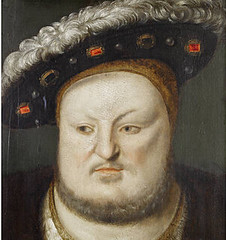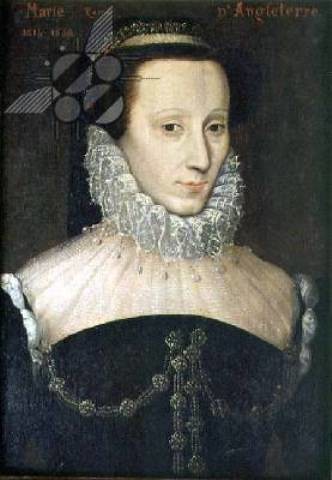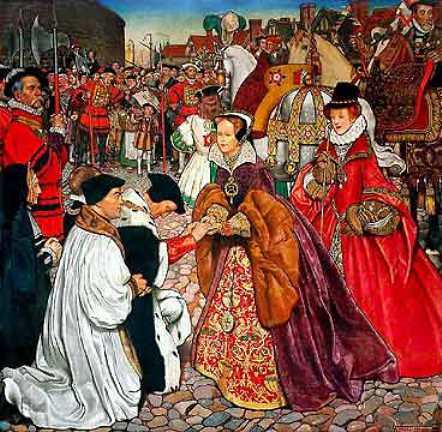These are mainly some portraits of Henry and his children. Their facial features are beautifully illuminated here and despite different mothers, I can see the family resemblance. Mary was the only child with a mother who was not English - the Spanish Catherine of Aragon. Elizabeth's mother was Anne Boleyn and Edward's was Jane Seymour.
Portrait of Henry VIII by an unknown artist. Anglo-Netherlandish School, c. 1548.
This is a revealing close-up of Henry's face. At the end of his life, Henry grew grossly overweight and was in terrible pain from his swollen legs. You can almost see the pain in his face. Henry reigned in England from April 1509 – January 1547.
 (his signature)
(his signature)

 A posthumous portrait of Mary Tudor made sometime in the late sixteenth century by an unknown artist. French school. Housed at the Musee Conde, Chantilly, France.
A posthumous portrait of Mary Tudor made sometime in the late sixteenth century by an unknown artist. French school. Housed at the Musee Conde, Chantilly, France.



 (his signature)
(his signature)
Portrait of Henry VIII by an unknown artist. Anglo-Netherlandish School, c. 1548.
This is a revealing close-up of Henry's face. At the end of his life, Henry grew grossly overweight and was in terrible pain from his swollen legs. You can almost see the pain in his face. Henry reigned in England from April 1509 – January 1547.


Mary Tudor - late sixteenth century
Entry of Queen Mary I into London

This is a lovely portrait of Elizabeth.

Queen Elizabeth I, c.1560
Portrait of Queen Elizabeth I by an unknown artist. Painted in the early years of her reign. Elizabeth, the daughter of Henry VIII and Anne Boleyn, was the last Tudor monarch and succeeded her sister Mary I in November 1558. There does not appear to be a determined portrait of Elizabeth during her sister’s reign but this slightly later image reflects well Elizabeth’s appearance around the time of her sister’s last years. Elizabeth had the longest Tudor reign lasting till her death in March 1603, which saw the end of Tudor reign and the beginning of Stuart rule in England.
 (her signature)
(her signature)

King Edward VI of England
This portrait of Edward VI was almost certainly painted during his reign. Dendrochonological analysis of the panel on which the portrait is painted has shown that the oak used was felled in the first half of the sixteenth century. Furthermore, the emphatic “ER”, for Edwardus Rex, suggests that the picture was intended as a portrayal of the current monarch, rather than as part of a later sixteenth century set of ‘corridor’ portraits.
Edward only reigned in England for 6 years from January 1547 to July 1553, when he died at the age of 15 from, what is believed, tuberculosis. (his signature)
(his signature)
No comments:
Post a Comment